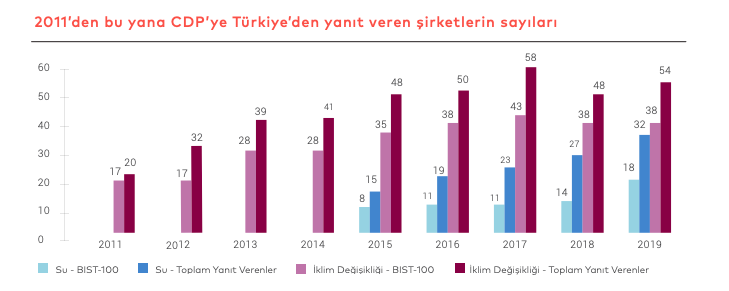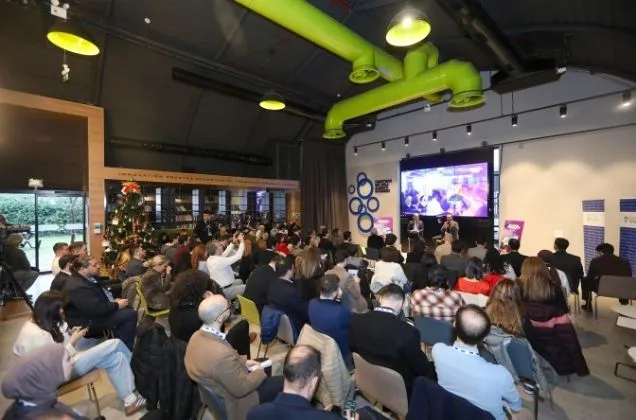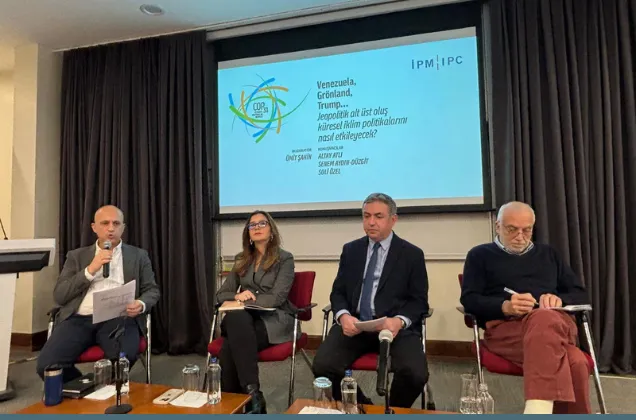24/09/2020
The 2019 Turkey results of CDP, implemented in Turkey by the Sabancı University Corporate Governance Forum Since 2010, were announced to the public at the "CDP Turkey Climate Change 10th Year Conference".
Key findings of the CDP Turkey 2019 Climate Change and Water Report:

The total number of companies reporting in the 10th year of the CDP Turkey Climate Change Program increased by 13% to 54.
Meanwhile, 32 companies reported in the 5th year of the CDP Water Program in Turkey. The number of respondents increased by 19% compared to last year.
There was also an increase in the number of high-performing Turkish companies on CDP's global rankings. The increase shows not only the growth in the number of Turkish companies that report, but also the improvement in reporting quality over the years.
All companies in Turkey reported that they integrated climate change in their business models.
The report reveals that Turkish companies are behind evolving global trends in joining advanced climate initiatives like science-based target setting, carbon pricing, or setting renewable energy targets.
The percentage of Turkish companies that implement internal carbon pricing has increased. Internal carbon pricing was implemented by 18% of the companies in 2018 compared to 27% in 2019.
The perceived risk of climate change is quite high for companies in Turkey. Almost all of the respondents (90%) have determined the climate risks that have the potential for material financial or stragetic effects on the business, while 78% have determined potential opportunities related to climate.
The majority of companies in Turkey are aware that matters such as effective climate change management or climate change strategy communication are important to their reputation. As reported by Turkish companies, the most prevalent climate-related risk is "Reputation" at 94%.
Among the respondents, 88% have actively performed at least one attempt to reduce emissions during the reporting year. More than half (53%) of companies report that the attempt was related to energy efficiency processes.
Almost all (96%) companies in Turkey report their energy consumption levels. Among them, 41% also report their renewable energy sources.
A significant majority of CDP respondents (94%) measure and track more than half of the water used in all of their operations. However, only 45% require their key suppliers to report water use, risks and management.
Among the respondents, 48% have measured their water consumption to be less than the previous year, while 26% report an increase.
Companies face financial risks due to water issues. Throughout the reporting period, 32% of Turkish companies have had a water-related issues, which were mostly torrents or droughts.
Risk assessment is made on the river basin level in 65% of the Turkish companies, while 90% of the respondents consider local communities in risk assessment.
Although companies report that water is one of the most significant risk factors and is thus dealt with at the Board level, the subject of water is yet to be fully associated with performance.
Ninety percent of companies include water-related issues in the long-term strategic business plans.
The vast majority (90%) have set company-wide targets and objectives for better management of water risks.
Among the respondents, 74% conduct climate-related scenario analyses to shape their business strategies. Only 19% of companies have set an internal price for water. This is lower than the ratio of companies that have internal carbon pricing (27%).
In 2019, 9 municipalities from Turkey responded to the CDP Cities Program: Bursa Metropolitan Municipality, Denizli Metropolitan Municipality, Eskişehir Metropolitan Municipality, Gaziantep Metropolitan Municipality, Istanbul Metropolitan Municipality, Izmir Metropolitan Municipality, Kocaeli Metropolitan Municipality, Municipality of Tuzla, Village of Kadıovacık.
To view the full report: https://cdpturkey.sabanciuniv.edu/tr




